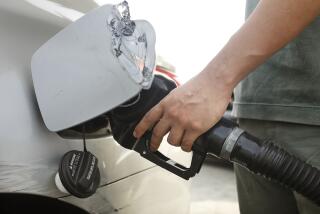Deficit Reduction Taxes Hit Gas Stations Today : Revenues: Pump prices go up 5 cents and airline tickets to 10% as the federal budget agreement passed in late October takes its first bite.
- Share via
WASHINGTON — In the first bite on consumers from the new budget agreement passed in the waning days of the 101st Congress, the federal gasoline tax goes up today by 5 cents a gallon and the airline ticket tax rises from 8% to 10%.
The tax increases will add 75 cents to the cost of a 15-gallon fill-up and $6 to the cost of an average airline trip for travelers. For the U.S. Treasury, the two tax changes will add about $37 billion to U.S. government revenues over the next five years.
As a result of the extra nickel tax on gasoline, the national average price of unleaded regular gas at self-service stations may climb to $1.41 a gallon this weekend, according to the American Automobile Assn. Added cost to motorists: $5 billion a year.
The price of an average round-trip airline ticket will go up from $300 to $306 because of the new 10% tax, according to a spokesman for the Air Transport Assn., adding another increase on top of a big jump in fares since Iraq’s invasion of Kuwait. Added cost for air passengers: $2.4 billion a year.
A second round of tax increases will hit on Jan. 1, when levies on beer, wine, hard liquor and cigarettes will rise along with a luxury tax on high-priced cars, jewelry, furs, yachts and planes. They will raise $16.3 billion for the Treasury by 1995.
The new taxes will hit just as the nation has started an economic downturn that could become a full-blown recession by next spring. Even so, economists generally believe that the extra revenues going to the federal government will not have a noticeable effect on the nation’s economic vitality.
“It certainly comes at the worst possible time for the airline industry,” said William Jackman, a spokesman for the Air Transport Assn. “We already raised fares an average of 15% because of rocketing (jet) fuel prices and a couple more percent is going to dampen demand, especially by corporate travelers. Travel is cut first when we come into a downturn.”
Travelers making personal trips, Jackman said, usually can plan in advance to take advantage of fare discounts that amount to 50% or 60% of the standard ticket price.
The higher gas levy will curtail driving “but not by very much,” according to Michael Canes, chief economist at the American Petroleum Institute.
In addition to raising the gasoline tax from 9 cents to 14 cents a gallon, the new deficit-reduction law will push up the diesel fuel tax from 15 to 20 cents a gallon and add a new 2.5-cent-a-gallon tax on diesel locomotive fuel.
Half of the new fuel tax revenue will be earmarked for the Highway Trust Fund to pay for road and public transportation improvements but half will be used to cut the nation’s $250-billion deficit.
The money raised by the higher airline ticket tax will go into the general fund until 1993, when it will be channeled to the Airport and Airway Trust Fund.
Under the Omnibus Budget Reconciliation Act that passed Congress in late October and was signed by President Bush, increased taxes and spending restraints are expected to lower the federal budget deficit by $490 billion over the next five years.
More to Read
Sign up for Essential California
The most important California stories and recommendations in your inbox every morning.
You may occasionally receive promotional content from the Los Angeles Times.










